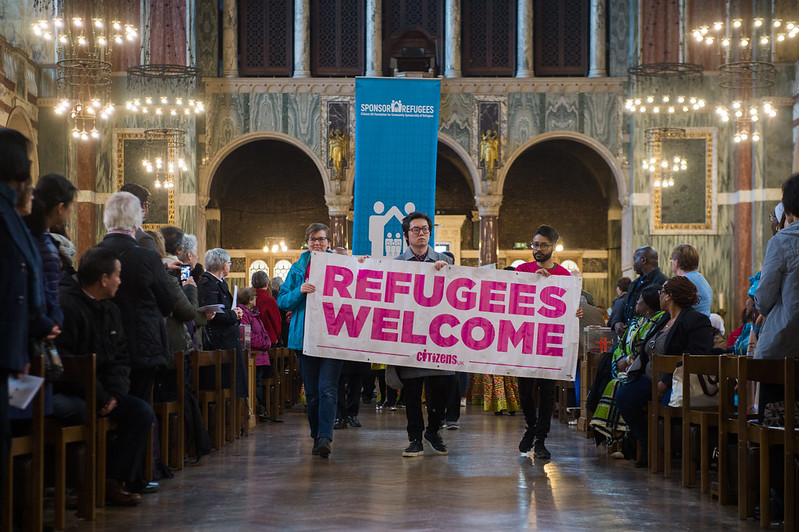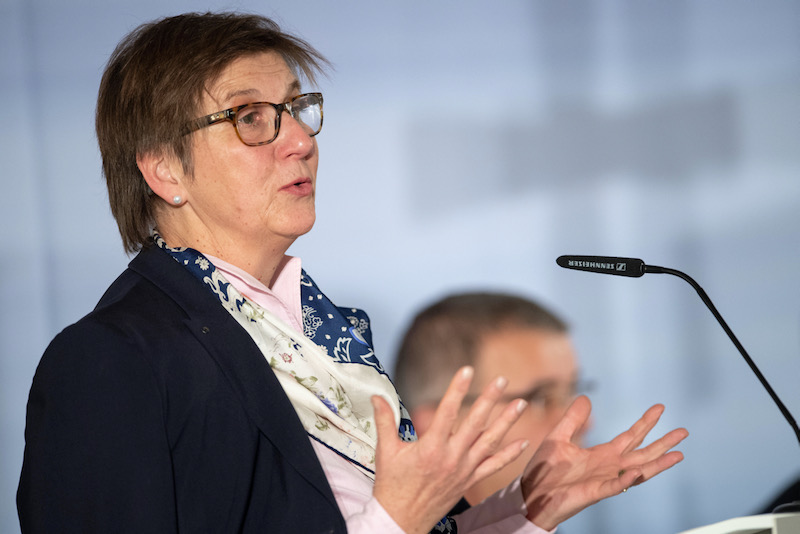Within a few days of each other, the president and vice-president of the Central Committee of German Catholics (ZdK), Germany’s largest and most important Catholic lay organisation, have signalled that they will not stand for re-election, writes Christa Pongratz-Lippitt. President Thomas Sternberg, 69, announced on 23 April that he would not stand for re-election. In 2019, together with Cardinal Reinhard Marx, Sternberg launched the German Synodal Procedure for church reform. He has come under criticism recently for “siding with the bishops” and not being “critical enough” in the re-appraisal of sexual abuse. He is said to have been very hurt by this criticism. At a mid-April ZdK meeting, Sternberg said: “I am resolutely opposed to a polarising, often polemical and hysterical style of debate such as is boosted by the not-so-social media.” Three days after Sternberg announced that he would not be standing for re-election, on 26 April, the long-standing vice-president, Claudia Lücking-Michel, told the Swiss Catholic agency kath.ch, that not only would she not stand for president now that Sternberg was resigning, but that she would be withdrawing from the ZdK altogether. She had had accepted a new job as head of a development aid agency, she said.
US President Joe Biden has become the first US president formally to recognise the killing of an estimated 1.5 million Armenians by the Ottoman Empire in the early twentieth century as “genocide”. He used the term after decades of his predecessors avoided it for fear of alienating Turkey, a Nato ally. Biden said last week that, "beginning on 24 April 1915, with the arrest of Armenian intellectuals and community leaders in Constantinople by Ottoman authorities, one and a half million Armenians were deported, massacred, or marched to their deaths in a campaign of extermination.” Largely Christian Armenia said it appreciated Biden’s “principled position” as a step towards “the restoration of truth and historical justice.” However, Turkey’s foreign minister said, angrily, “we will not be given lessons on our history from anyone.” In Armenia last Saturday, people streamed to the hilltop complex in Yerevan, the capital, that commemorates the victims. Many laid flowers around the eternal flame, creating a wall of blooms seven feet high.
The ASEAN Summit on 24 April lobbied Myanmar’s military rulers to agree to end deadly violence. Myanmar junta leader General Min Aung Hlaing attended the summit of the Association of Southeast Asian Nations in Jakarta. In his first foreign trip since the military coup in February, he heard calls for the military to stop killing protesters and to release political prisoners. More than 700 people have been killed and more than 3,300 are in detention.Myanmar's newly formed National Unity Government, made up of opponents of the coup and allies of the winner of last November’s election Aung San Suu Kyi', said, “we look forward to firm action by Asean to follow up its decisions and to restore our democracy and freedom for our people and for the region.”
The Catholic Church in Zambia has announced a partnership with the government-owned mobile network, Zamtel, that could see its six million members use Zamtel Mobile Money services to send their contributions to the Church. Under the partnership, parishioners will tithe and make donations to the Church using the money platform. In return, Zamtel will provide its products to parishioners and will connect with the church membership through its Catholic-run media platforms and radio stations. Zambia Conference of Catholic Bishops Communications Secretary, Father Winfield Kunda, who signed the agreement on behalf of the Church, said the partnership would be of immense benefit to the Church in connecting its millions of members across the country.
Catholic bishops in Chad have called for dialogue among the country’s warring political parties following the death of the country’s President Idriss Deby last week from wounds “sustained on trhe battlefield”. On the day of his funeral in N’Djamena on Friday 23 April the bishops said: “This inclusive national dialogue for reconciliation is today a necessity for lasting peace in our country.” President Emmanuel Macron of France attended the funeral and said France would “not let anyone threaten Chad’s stability. There are 5,100 French troops in the region.
Wisconsin Attorney General Josh Kaul intends to investigate that state’s five dioceses, examining their handling of clergy sex abuse. In a letter to the dioceses, obtained by the Milwaukee Journal Sentinel, Kaul said, “I agree with the many survivors of clergy abuse, and those who support and have advocated for them, that a review by our office is necessary to provide accountability and, ultimately, healing.”
Cardinal Blase Cupich warned parishioners at St Sabina church to stop obstructing investigators examining charges of sex abuse lodged against their longtime pastor Fr Michael Pfleger. “Once again this week there was an organised effort through the St Sabina website to employ inappropriate and intimidating tactics to put pressure on the Archdiocese of Chicago and the Independent Review Board (IRB) as the case of Fr Michael Pfleger is being processed,” Cupich wrote to the interim pastor. Pfleger stepped aside in January when the first allegation was lodged. Since then, two additional allegations have been made.
Three Democrat legislators have written to Supreme Court JusticeAmy Coney Barrett, asking that she recuse herself from a case involving the libertarian organisation Americans for Prosperity. The organisation, funded in part by Charles Koch, spent “seven figures” in advertising in support of Barrett’s confirmation. It is suing to overturn a California regulation requiring it to disclose its donors. A report also surfaced that Barrett has received a $2 million book deal for a book about jurisprudence.
The Papal Nuncio in Mexico, Archbishop Franco Coppola, visited the town of Aguililla, Michoacan on Friday last week to show support for residents beset by violence. Warring cartels have closed off roads in the region and the town has been largely inaccessible for months. “Unfortunately, violence is not just characteristic of Michoacan, but all of Mexico”, Coppola said during the visit. “It is very important that people know what is going on. The bad guys take advantage of silence.” The Bishop of Apatzingán, Michoacan, Cristóbal Ascencio, accompanied Coppola. He said, “The Mexican people are completely abandoned by those who have the obligation to protect them.”



 Loading ...
Loading ...